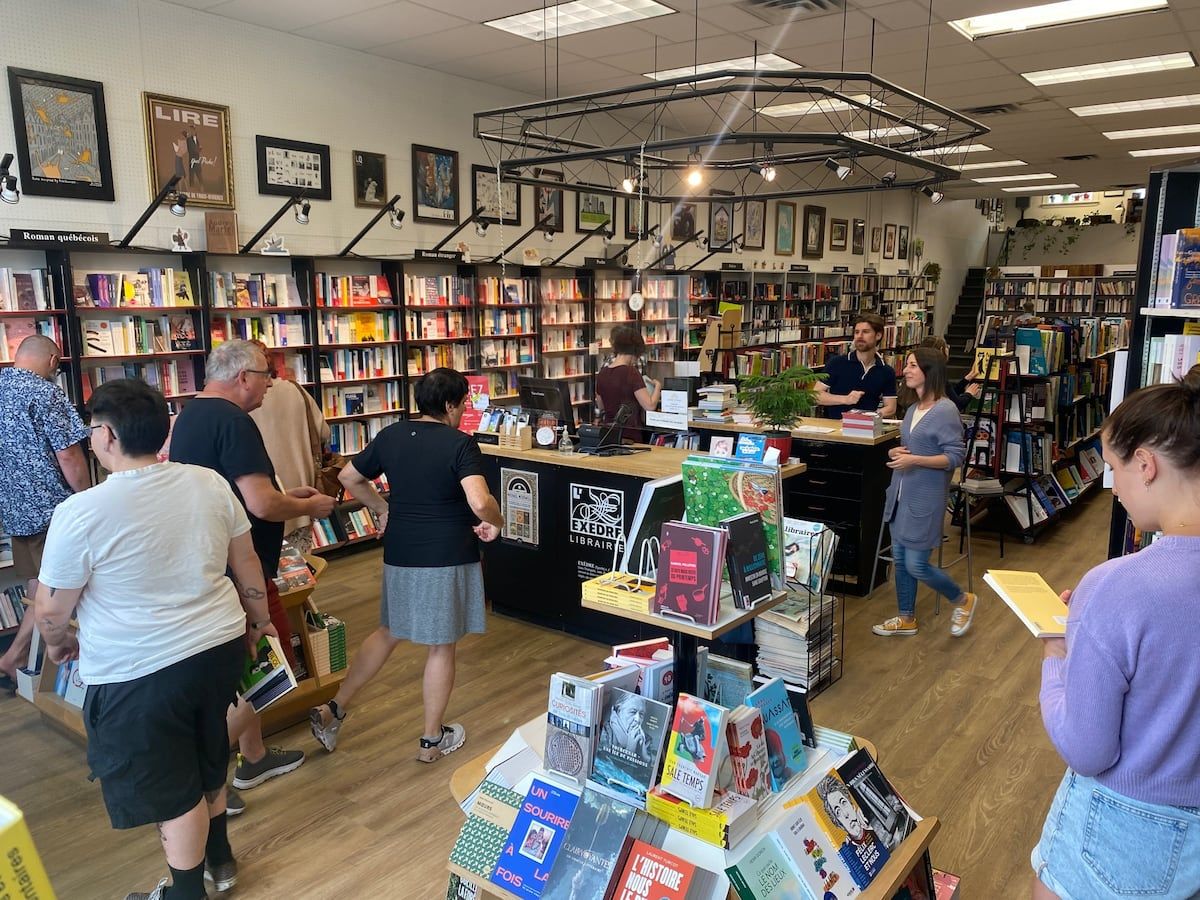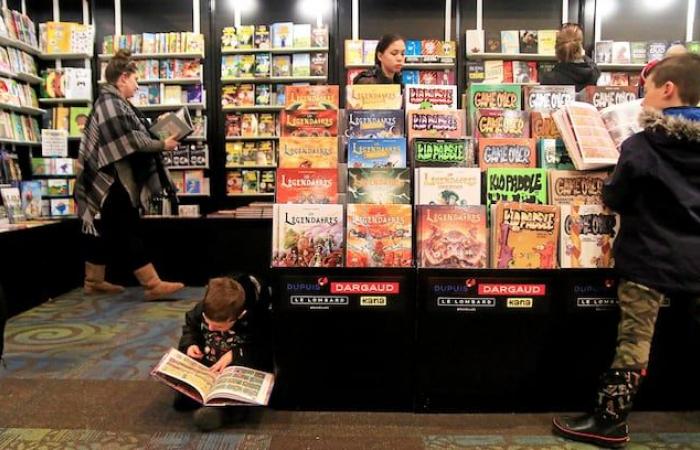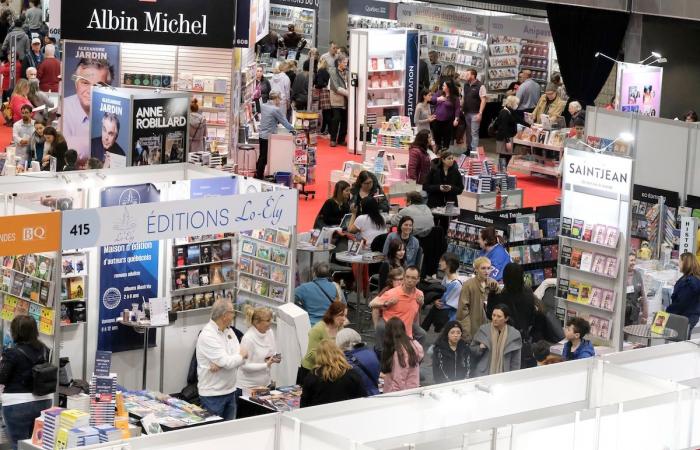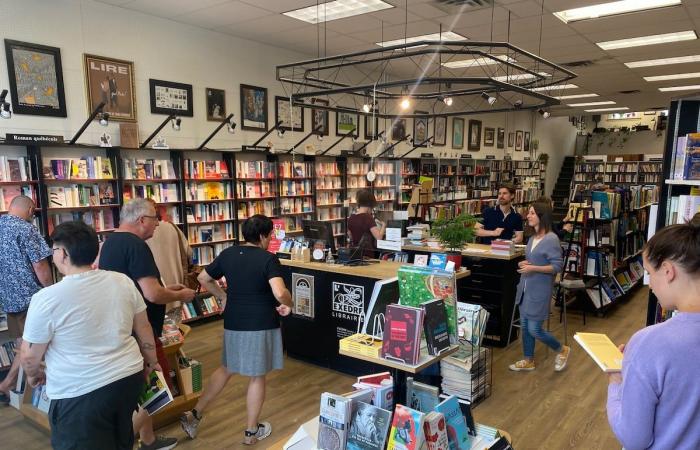Certainly, sales are what ultimately motivates the players in the “book chain” to come together in a living room to celebrate a recent publication or an author in the spirit of the times. Especially since, without being out of reach of the purse, renting a kiosk remains a cost, especially for emerging authors and those who self-publish… and there are “more and more of them in Outaouais”, notes Ms. Legault-Dallaire.
“Yes, you have to think about the business side, but it’s much more than that.”
“A salon is access to literature, a place to put culture forward,” she explains. It is a space that “gives access to authors, meetings, round tables and all kinds of activities organized around the show, so it goes well beyond the simple fact of buying or selling books” , since it allows us to nourish readers, provoke discoveries, build imaginations, and fuel debates.
“A fair is access to literature,” says the president of the board of directors of the Corporation du Salon du livre de l’Outaouais, Claudia Legault-Dallaire. (Etienne Ranger/Le Droit)
By the way, the name “book chain” is outdated, specifies Ms. Legault-Dallaire.
From now on, it is appropriate to favor “book ecosystem”, a more inclusive designation (we welcome libraries, among others) and which moves away from the mercantile image making the financial transaction the final link in the chain. While the “chain” evoked its commercial dimension – a reductive image – “ecosystem” emphasizes the interdependence of the sector, suggests the one who is first and foremost a bookseller, co-owner of the Bouquinart boutique, in Aylmer.
A “unifier”, Ms. Legault-Dallaire intends more than ever to work to “enrich the links between all the different actors in the sector”, so that the SLO can flourish even more.
The size, traffic and reputation make the SLO the 3rd most important book fair in Quebec. (Patrick Woodbury/Le Droit)
In his eyes, literary fairs find themselves precisely “at the center” of this ecosystem, since they are the meeting point for all of its stakeholders: authors and authors’ associations, publishers, printers, exhibitors, broadcasters, distributors. , booksellers, librarians. Without forgetting, of course, the readers.
Overall, the environment is “supportive and proactive”, but everyone sometimes tends to try to “take cover for themselves”. “Everyone has their own realities, their own issues and I have the impression that we sometimes forget the realities of others,” shares the woman who sat on the board of the SLO Corporation since 2018, before being elected. president, on September 11.
However, “the goal of a book fair is to bring together all these actors to find solutions together. […] It would be nice if we managed to speak with one voice.”
Courting the private
“It’s all together that we will be able to either knock on the government’s door to say ‘Find us an envelope’ or find internal solutions” linked to the search for new private partners – and the establishment of parameters to govern future sponsorships.
Courting the private sector, “I wouldn’t say that we are reluctant to go too far towards that, we even think that we have to do it”, given the relative decline in the generosity of public authorities.
“We already have patrons who help us financially. The question is why do we have to go through them? I find it a shame that there are not more funds [publics] for culture.”
— Claudia Legault-Dallaire
The fact remains that “we have to ask ourselves how to do it well”, this recourse to the private sector: “there are ethical questions to ask, it has to respect the values of the show.” Ms. Legault-Dallaire does not want to flood the show with sponsors, nor do she want to duplicate the show, for example by selecting two competing financial institutions.
“We are starting to have more and more private partners,” she notes. And these make certain activities at the show profitable, or make them more lively. “But how far are we prepared to go,” she asks. Should we associate names of sponsors with the spaces or activities of the show?
“We don’t all agree on these questions, but we all agree to push the thinking further.”
A player is missing
However, around this discussion table, a crucial player is missing.
In Outaouais, one player is conspicuous by his absence, within the book ecosystem: publishers, she recalls. Which somewhat handicaps all the other actors. This, even if the “book market is growing – and Quebec books even more so” throughout the province.
“And I don’t see any sign of decline, despite the more difficult economic realities,” adds Ms. Legault-Dallaire, referring to the inflationary situation which affects the whole of society.

(Bookseller L’Exèdre)
Bookstores overall “experienced a completely crazy August 12, once again!” she adds to illustrate her point. August 12 is the date when I buy a Quebec book event!” encourages readers to stop by a bookstore.
If some players in the sector may appear concerned, “it is perhaps because, willing or unwilling, the price of books is increasing and the fixed costs of booksellers are also increasing. But I have no worries. Our percentage [marge bénéficiaire] remains the same. Readers are really there, they are buying, they like to read, the literary season is in full swing. It’s incredible the literary quality we have now. As someone who loves Quebec literature, I don’t even know where to stack all the books I want to read… There are too many!”
Generally speaking, independent bookstores do not step on each other’s toes and live in good harmony, each having managed to find a niche that the others do not exploit, she explains.
“There are not many bookstores per square foot in Outaouais. Most are concentrated in the Gatineau territory. And there’s no channel, either.” (A bookstore becomes a chain from four branches.)
It is also the lack of accessibility to books in rural areas that pushed the SLO to develop Literary Caravans, an initiative allowing a range of authors to travel to areas further from major urban centers, to meet the school public.
In addition, purchases by public libraries – whose “budgets have not changed at the moment,” she says – are holding up.
The editors
Since the Gatineau publishing house Vents d’Ouest interrupted its activities in March 2020, “there is no longer a publisher in Outaouais; in any case, no longer broadcast widely across Quebec,” laments the new president of the SLO.
The tiny Neige-Galerie, co-founded by cartoonist Christian Quesnel, closed its doors four years ago. There is still La Note Verte, a small publishing house (and music school) based in Maniwaki. And, in Gatineau, the house Les Alluvions, launched in 2022 by author-publisher Jean-Rodrigue Paré, who has in the meantime published three titles including two self-published novels. (In Ottawa there are also the David and L’Interligne editions)
However, their influence outside the Outaouais is “very limited”, because they do not have the support of any of the major distributors who could ensure the distribution of their works across Quebec or even in the rest of Canada.
In the absence of a local publisher strong enough to shine, Outaouais authors are reduced to looking elsewhere, far away, where to nest their writings or agree to self-publish, something to which several members of the Association of authors from Outaouais (AAAO), in the past. A choice which does not facilitate their influence, says Claudia Legault-Dallaire.
Independent authors and publishers, however, manage to find this visibility at SLO, where they are always welcome, she pleads.
Seeing the region deserted by publishers saddens him: “However, there is no shortage of talent in the region. It’s even incredible, the amount of talent we have!”
“The quantity of literary works coming from Outaouais is incredible! It’s a rich offering – and widely distributed across Quebec – and we are happy and proud of that. At the show, we never ‘forced’ ourselves to highlight local talent, it happened naturally.”
Could the SLO or the House of Literary Arts consider taking on part of this role of local publisher?
Prudente, the president of the SLO will not answer this question before having had the opportunity to discuss it with the members of her board. Starting a cultural business is “never easy,” but starting a publishing house and keeping it afloat is a special challenge, she believes. “It’s a lot of work, time, energy.”








